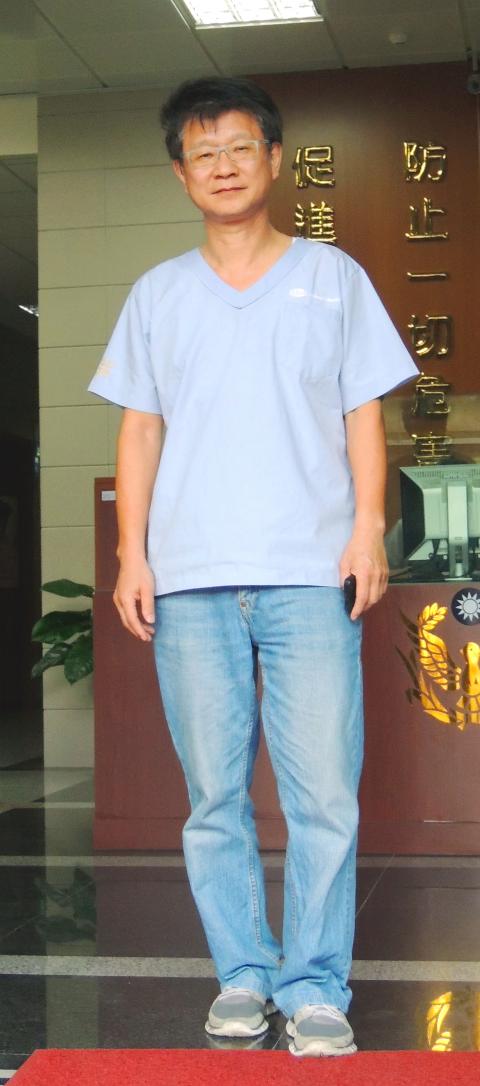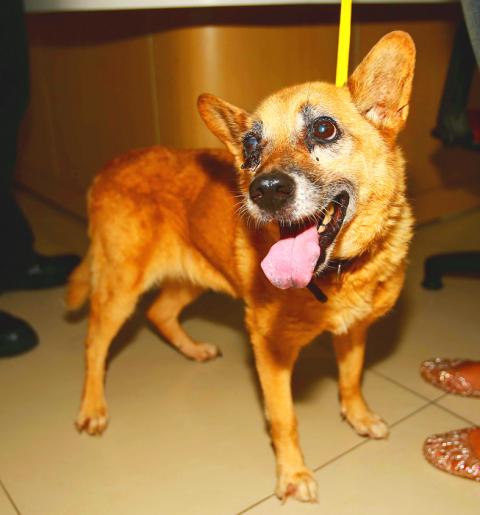The Australian Office Taipei, the de facto embassy of Australia, is facing a hairy public relations problem named Benji.
Benji is a 10-year-old mongrel that had a debilitating stroke earlier this year and was taken to a local veterinarian, Yang Dong-sheng (楊東盛). According to the dog’s owner, Representative Kevin Magee of the Australian Office Taipei, Yang had advised euthanization.
“Our family came to the difficult decision to have Benji humanely euthan[i]zed to save her needless indignity and suffering. We did so on the advice of the family vet, and in consultation with Benji’s previous owners,” said Magee in a formal statement released yesterday.

Photo: LT and Enru Lin, Taipei Times
Unbeknownst to Magee, Yang accepted payment for euthanization but did not euthanize the dog. Instead, Yang continued to treat Benji at his own expense. Within a few weeks, the dog had recovered enough to bound out of Yang’s home and into the net of a Beitou-based dog-catcher.
“We trusted the vet and were shocked to learn that Benji had been found wandering on the street. Thankfully, she was taken to the animal shelter. Benji has now returned to our home,” said Magee, who filed a lawsuit against Yang for fraud on Thursday.
Since then, the case has triggered public outcry. “At the Yangming clinic there is a dog without front legs, A-bao, and a dog without back legs, Ah-ji-ah — Dr. Yang rescued both and has adopted them. He is a really good veterinarian and the fact that he is being sued is infuriating,” posted a woman surnamed Lu to the Taipei Times’ sister newspaper Liberty Times, where the story was first carried.

Photo: LT and Enru Lin, Taipei Times
Animal rescuer Sean McCormack, another of Yang’s veterinary clients, is promoting a phone campaign against the Australian Office.
“The diplomat may think he has a legal right to sue Dr. Yang for some kind of breach of contract, but to threaten one of Taiwan’s most compassionate vets for saving a dog’s life instead of killing him was a very unwise and undiplomatic move. He should demonstrate true Australian character and make amends by releasing Benji to Dr. Yang’s care immediately,” McCormack said.
VET’S REPORT
Yang stressed yesterday to the Taipei Times that he did not advise euthanization.
“When the woman brought her in, this dog couldn’t stand up. After blood work and other procedures I diagnosed the dog with a stroke,” said Yang. “Because it was only a stroke, I told the woman that the possibility for recovery is high. In most cases, these cases can be cured,” Yang said.
“She said that she would go home and discuss it ‘with them.’ I didn’t know who ‘they’ were,” Yang added.
The veterinarian, who filed his testimony yesterday at Wenlin Police Station (文林派出所), said he had believed the woman was the dog’s owner. He never interacted with Magee or other members of the family, Yang said.
“To be honest, when she came in, I did not know she was [the Magees’] maid … I could not tell from her appearance that she was their maid, and she did not tell me she was their maid … When she brought it over, of course I thought she was the owner,” said Yang.
According to Yang, the woman understood that he would continue to treat the dog.
“Later she brought the dog back and said that the decision is to euthanize. I said, ‘We haven’t come to that bridge yet.’ I told her I would continue trying to treat the dog, but would collect a bill for the medical care so far, the euthanizing fee and the cremation fee [NT$8,500 total], because it’s possible that the dog will still die,” said Yang.
“I very clearly told her that the dog will continue to be treated. The woman was thankful and she cried — literally, I saw tears. I found out later that she had been the primary caretaker for the dog,” said Yang.
AUSTRALIAN OFFICE RESPONDS
Earlier this month, Yang received a call from a staffer surnamed Liu at the Australian Office Taipei. “I didn’t know why she was contacting me. Then during our conversation I discovered that Benji belongs to someone at the Australian Office,” Yang said.
According to Yang, the staffer said Benji is one of two dogs adopted by a former Australian representative. When the former chief left on assignment to China, his replacement, Magee, inherited the dogs.
Yang later received a call from Magee himself, who requested a refund for the NT$8,500 paid for euthanization and other services, as well as a formal apology. Yang refused, saying that NT$8,500 is less than the expenses incurred for Benji’s full course of treatment. “We argued violently and he said he would take it to the police,” said Yang.
Meanwhile, a spokesperson for the Australian office said that the case is a private matter involving the family of a staff member and that the office would not be offering comment.
Australia’s Department of Foreign Affairs and Trade also emphasized the apolitical nature of the case. “This is a personal matter between Australia’s representative in Taiwan and another individual. It does not impact Australia’s relationship with Taiwan,” said a spokesperson in Barton, Australia.

Jan. 5 to Jan. 11 Of the more than 3,000km of sugar railway that once criss-crossed central and southern Taiwan, just 16.1km remain in operation today. By the time Dafydd Fell began photographing the network in earnest in 1994, it was already well past its heyday. The system had been significantly cut back, leaving behind abandoned stations, rusting rolling stock and crumbling facilities. This reduction continued during the five years of his documentation, adding urgency to his task. As passenger services had already ceased by then, Fell had to wait for the sugarcane harvest season each year, which typically ran from

It’s a good thing that 2025 is over. Yes, I fully expect we will look back on the year with nostalgia, once we have experienced this year and 2027. Traditionally at New Years much discourse is devoted to discussing what happened the previous year. Let’s have a look at what didn’t happen. Many bad things did not happen. The People’s Republic of China (PRC) did not attack Taiwan. We didn’t have a massive, destructive earthquake or drought. We didn’t have a major human pandemic. No widespread unemployment or other destructive social events. Nothing serious was done about Taiwan’s swelling birth rate catastrophe.

Words of the Year are not just interesting, they are telling. They are language and attitude barometers that measure what a country sees as important. The trending vocabulary around AI last year reveals a stark divergence in what each society notices and responds to the technological shift. For the Anglosphere it’s fatigue. For China it’s ambition. For Taiwan, it’s pragmatic vigilance. In Taiwan’s annual “representative character” vote, “recall” (罷) took the top spot with over 15,000 votes, followed closely by “scam” (詐). While “recall” speaks to the island’s partisan deadlock — a year defined by legislative recall campaigns and a public exhausted

In the 2010s, the Communist Party of China (CCP) began cracking down on Christian churches. Media reports said at the time that various versions of Protestant Christianity were likely the fastest growing religions in the People’s Republic of China (PRC). The crackdown was part of a campaign that in turn was part of a larger movement to bring religion under party control. For the Protestant churches, “the government’s aim has been to force all churches into the state-controlled organization,” according to a 2023 article in Christianity Today. That piece was centered on Wang Yi (王怡), the fiery, charismatic pastor of the